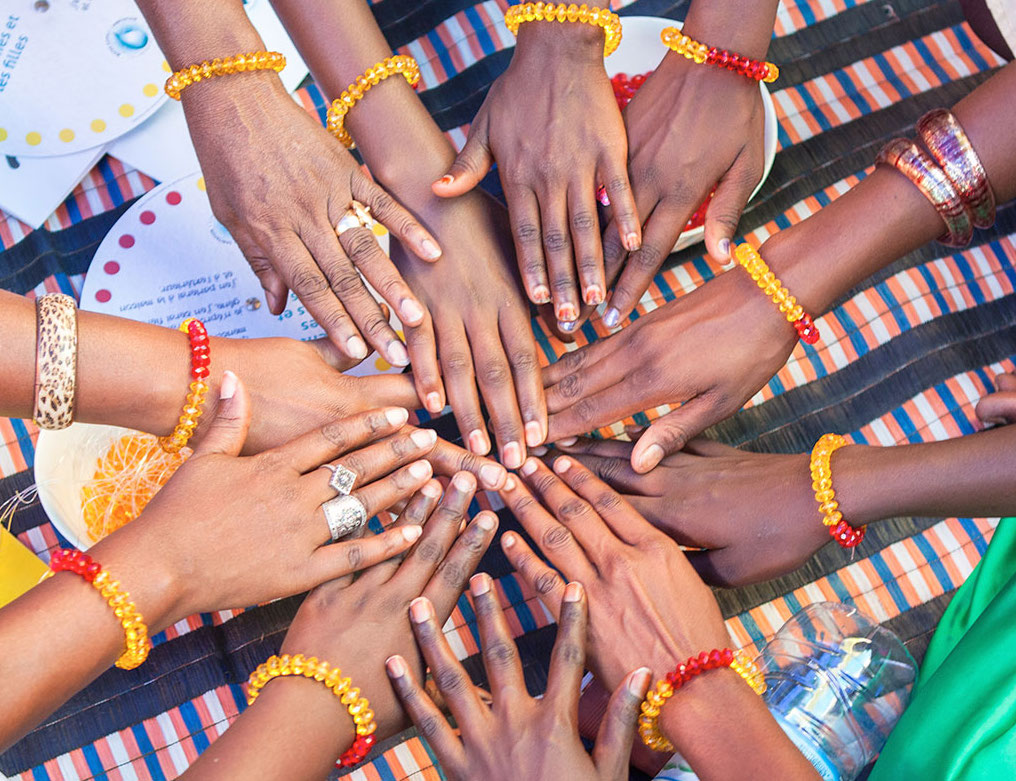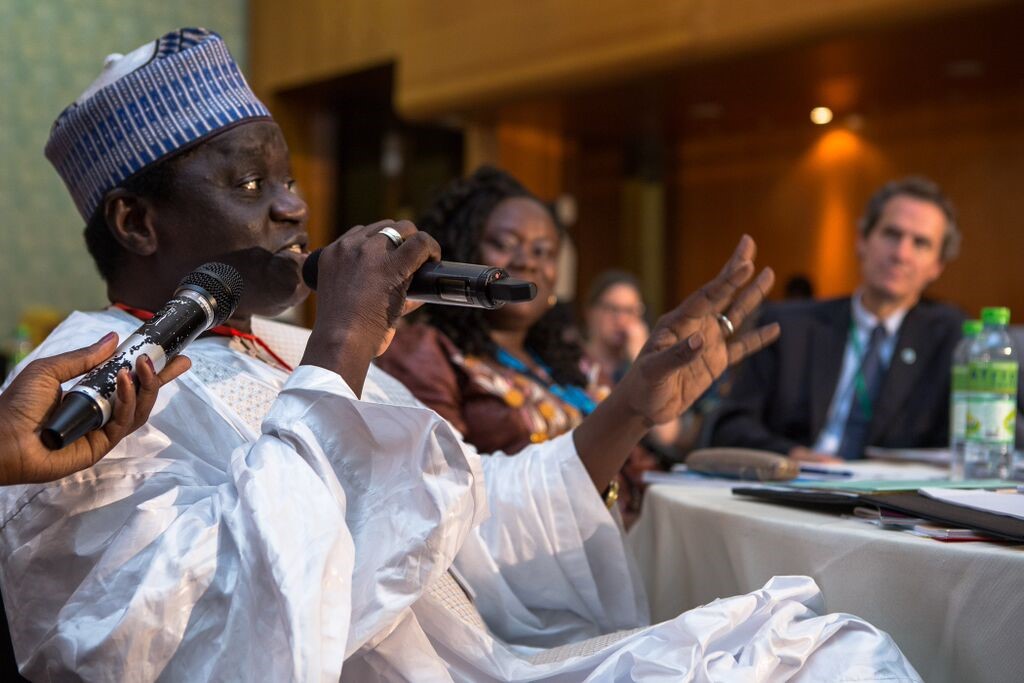From taboo to empowerment: menstruation and gender equality
Inga T. Winkler, May 31 2016

Menstruation and menstrual hygiene
are emerging as pivotal issues for gender equality, human rights and
development.
In many parts of the world,
menstruation tends to be taboo, surrounded by silence and shrouded in
myths. Yet, menstruation and menstrual hygiene are emerging as
pivotal issues for gender equality, human rights and development.
Indeed, menstruation perpetuates humanity and should be celebrated
today and every day, rather than hidden behind shame and disgust.
In 2012, the Water Supply and
Sanitation Collaborative Council (WSSCC) spoke to 12,000 women and
girls in five states of India over 56 days during the Nirmal Bharat
Yatra, which was a massive national campaign around sanitation and
hygiene. We created a safe space to talk about menstruation and the
response was tremendous: women and girls gathered in large numbers
with mothers, grandmothers, sisters and friends to discuss, share and
ask the most intimate of questions. They tested simple training and
communication tools and partnered in developing methodologies to
break the silence and create safe menstrual hygiene management
conditions together.
In 2014 WSSCC took this approach to
West Africa and launched the Joint Programme ‘’Gender, Hygiene
and Sanitation” with UN-Women. The programme undertook a series of
studies aimed at breaking the silence on menstruation and menstrual
hygiene in the region.
One of the most significant barriers
for women is the social restrictions, beliefs and myths that
influence the management of menstruation. The studies’
findings echo the silence and concerns from many countries around the
world.
A first—and very critical—problem is limited or incorrect
knowledge and information.
Many girls do not understand what is
happening when they start menstruating and have limited knowledge on
biological processes.
As one girl in Cameroon explained: “My
periods started when I was in the field with my mother. Since I was
ashamed I didn’t say anything to her… when my mother realized
that it was my period, she discreetly took me into her bedroom and
took out a sanitary cloth and explained to me how to wear it. She
also told me not to greet any boys anymore, because if I did I would
fall pregnant straight away.”
Due to a lack of facilities at school,
at work and in public spaces, women often prefer to manage
menstruation at home, meaning they are unable to participate in
cultural, educational, social and income-generating activities.
Poor
practices and unsafe materials compound this problem.
In addition,
many women and girls lack access to safe and hygienic materials.
They
report drying menstrual cloths in private and dark locations, which
does not guarantee the elimination of germs.
In fact, inadequate
cleaning and drying of materials is a major cause of infection.
Where
women use disposable materials, they usually dispose of used
materials into toilets and latrines that cannot handle this waste,
leading to clogging, overflowing and pollution.
One of the most significant barriers
for women is the social restrictions, beliefs and myths that
influence the management of menstruation and, as a result, affect the
daily lives of women and girls. When menstruating, women and girls
are subjected to various religious, food-related, domestic or sexual
prohibitions, which often lead to further isolation or
stigmatization.
Finally, perceptions of menstruation
affect how many cultures perceive girls.
Starting to menstruate is
often viewed as a sign of maturity, meaning girls have reached a
potentially marriageable age.
Yet early marriage significantly
increases the risk of child pregnancy, repeated pregnancy without
adequate birth spacing, and complications such as obstetric fistula.
 |
| Wassalke Boukhari, Minister of Water and Sanitation |
Despite the veil of secrecy shrouding
menstruation, menstrual hygiene management provides a powerful entry
point to empower women and girls, dispel myths, change practices and
remove restrictions. In fact, all participants in our studies were
eager to discuss menstruation.
They asked a wide range of questions
about sexual and reproductive health and early pregnancy,
highlighting the need for comprehensive sexuality education.
It is
especially imperative that adolescent girls be able to access
correct, basic information before they have their first period.
At the same time, WSSCC has witnessed
great openness among policy-makers to address menstrual hygiene once
they become aware of the broad implications it has for women’s and
girls’ lives and see the urgent need to address it.
For example,
last year the Government of Senegal signed a memorandum of
understanding to improve women’s and girls’ rights to water and
sanitation.
The agreement is an integral part of the Ministry of
Water and Sanitation’s aim to include the issue of menstrual
hygiene management in the updated national sanitation policy.
To achieve such broad change, WSSCC
calls on national and local governments to articulate clearly the
need for menstrual management in policies.
Policy reforms need to be
bolstered by dedicated budgets and resources for policy
implementation, as well as capacity development in institutions.
This
should include programme implementation officials working in the
WASH, education, health and environment sectors.
WSSCC will continue
to support trainings on menstrual hygiene and develop capacity for
outreach and awareness campaigns to demystify menstruation among
women and men.
It is essential to raise awareness among religious,
community and other leaders to support the participation of women and
girls in decision that concerns their lives, and it is also important
to work with women and men as well as girls and boys.
While some people are still
reluctant to discuss it, menstrual hygiene has proven to be a
powerful entry point to raise broader issues around gender equality
and women’s and girls’ empowerment, including challenging issues
such as sexuality education, sexual and reproductive health and
rights, child marriage, fistula and female genital mutilation.
With
this in mind, countries must aim to eliminate all forms of
discrimination against women, including discrimination based on
social norms surrounding menstruation that harm the physical
integrity and human rights of women and girls.
Menstruation is a sign
of female health and vitality and can no more be shrouded in fear,
shame or embarrassment. Breaking the silence around menstruation is
essential for women and girls to be able to reach their full
potential.
SOURCE: Open Democracy


